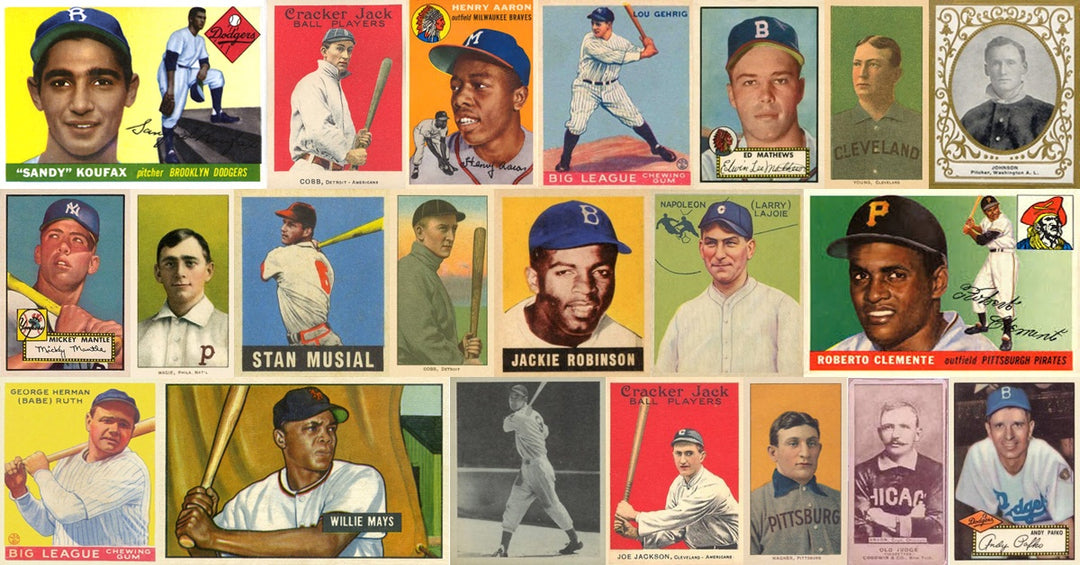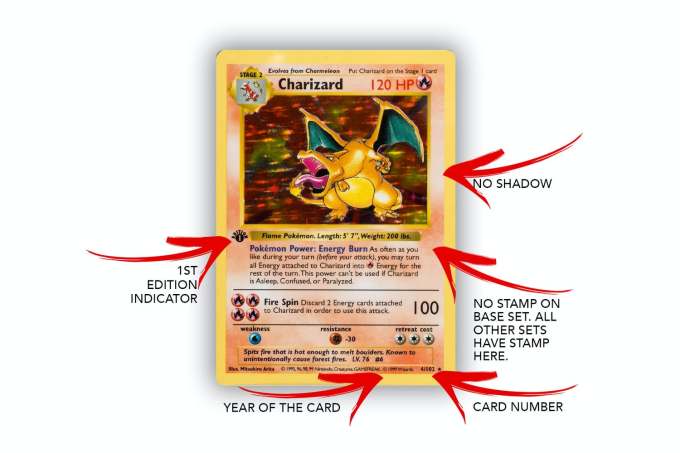How Do You Value A Sports Card Collection?

Sports cards have been around since the 19th century and were originally used as advertising tools by tobacco companies. Over time, they grew in popularity and soon became collectibles coveted by fans of all ages. Even vintage sports cards are highly sought after today for their historical significance.
Another factor that contributes to the value of a sports card is its condition. Professional sports card graders, such as PSA and SGC, are experts in assessing a card's condition and assigning it an appropriate grade - from one to ten. The higher the grade, the more valuable the sports card is likely to be.
Finally, adding vanity slabs to your collection can also increase its value. Vanity slabs are protective cases, which makes them ideal for protecting valuable cards. With so many different varieties available, vanity slabs can add an extra layer of protection to your collection while also increasing its market value.
These are just some of the key factors that affect the value of sports cards. In addition to these criteria, the current market conditions play a major role. That means that the worth of your collection can fluctuate over time, so it’s important to keep an eye on market trends if you want to maximize its value.
Sports card collecting is a fun and exciting hobby for fans of all ages. From vintage cards featuring legendary players to modern-day rookie cards, there are plenty of collectibles out there for everyone. Whether you’re a seasoned collector or just starting out, taking time to understand the factors that affect a card's value can help ensure your collection is worth its weight in gold.
1. Research: Familiarize yourself with the market and current trends to understand the demand for specific cards.
2. Condition: Assess the condition of each card by examining corners, edges, and surface quality.
3. Rarity: Determine the rarity of cards by considering factors like limited editions, autographs, or unique features.
4. Grading: Consider getting cards professionally graded to determine their condition and authenticity.
5. Market Value: Consult online price guides, auction results, and trading platforms to determine the market value of individual cards.
Valuing a sports card collection involves a combination of research, condition assessment, rarity evaluation, professional grading, and market analysis. With these steps, you can determine the value of your collection accurately.

How Do You Value a Sports Card Collection? – A Comprehensive Guide
Valuing a sports card collection can be an exciting yet challenging task. Whether you’re a seasoned collector or just starting out, understanding the factors that contribute to a card’s value is crucial. In this comprehensive guide, we will explore the various aspects of valuing a sports card collection and provide you with valuable insights and tips to help you navigate this process.
1. Rarity and Scarcity
One of the primary factors that determine the value of a sports card is its rarity and scarcity. Rarity refers to the limited number of cards produced, while scarcity relates to how difficult it is to find a particular card in the market. The fewer cards available, especially in top condition, the higher the value of the card. For example, rookie cards of legendary athletes like Michael Jordan or Babe Ruth are often highly sought after due to their limited availability.
Additionally, cards from specific sets or limited editions can also contribute to their rarity. Cards from special inserts or autographed cards are often considered more valuable due to their limited production runs. Understanding the rarity and scarcity of your cards is essential in determining their worth.
2. Condition and Grading
The condition of a sports card plays a significant role in determining its value. Collectors and buyers prefer cards that are in excellent condition with minimal wear and tear. Small imperfections, such as creases, stains, or fading, can significantly impact the value of a card.
Card grading services, such as Professional Sports Authenticator (PSA) or Beckett Grading Services (BGS), provide professional assessments and assign a numeric grade to cards based on their condition. Higher graded cards often command higher prices in the market, as they are considered to be in superior condition. Taking care of your cards by storing them in protective holders and avoiding exposure to extreme temperatures or moisture can help preserve their condition and maintain their value.
3. Demand and Popularity
The demand and popularity of a particular sports card can greatly influence its value. Cards featuring iconic athletes, significant milestones, or memorable moments in sports history tend to be more sought after by collectors. For example, a card depicting a record-breaking performance or a championship-winning play can attract a higher price due to its historical significance.
Current trends in the sports card market can also impact the value of certain cards. The popularity of specific players or the emergence of new stars can create a surge in demand for their cards, potentially driving up their value. Keeping track of the latest trends and staying informed about the sports world can help you identify valuable cards within your collection.
4. Market Conditions and Sales Data
Market conditions and sales data are essential factors to consider when valuing your sports card collection. Monitoring auction results, online marketplaces, and sales records can provide valuable insights into the current market value of specific cards. Online platforms like eBay or dedicated sports card marketplaces can offer a wealth of information regarding recent sales and the prices cards are fetching in the market.
It’s crucial to remember that the value of sports cards can fluctuate over time. Economic factors, supply and demand dynamics, and changing trends within the hobby can all influence the market value of cards. Regularly researching and staying up-to-date with market trends can help you make informed decisions when it comes to valuing your sports card collection.
5. Authentication and Provenance
Authentication and provenance are vital aspects when assessing the value of sports cards, particularly for rare or valuable pieces. Ensuring the authenticity of a card is essential in maintaining its value and desirability. Cards that come with a certificate of authenticity (COA) or have been professionally graded by a reputable grading service provide reassurance to collectors and buyers.
Moreover, establishing the provenance or the documented history of a card can add value to the piece. Cards with notable provenance, such as being part of a famous collection or having a significant historical connection, often carry additional value in the market. Keeping track of the origin and history of your cards can enhance their overall worth.
6. Supply and Demand Dynamics
The supply and demand dynamics within the sports card market can significantly impact the value of your collection. When demand outweighs supply, prices tend to rise, and vice versa. Understanding the current market trends and identifying cards that are in high demand can help you determine their potential value.
Factors such as retirements, hall of fame inductions, or players’ performances can influence the demand for specific cards. Additionally, collector trends and preferences can also shape the market dynamics. Staying informed about these factors and their impact on the sports card market will enable you to make informed decisions regarding the value of your collection.
7. Professional Appraisals
For more precise and accurate valuations, professional appraisals can be sought. Experienced sports card appraisers have in-depth knowledge and expertise in valuing collections. They consider multiple factors, including rarity, condition, demand, market trends, and recent sales data, to provide a comprehensive appraisal of your sports card collection.
Consulting a professional appraiser can be particularly beneficial if you have a large or valuable collection that requires a thorough evaluation. Their insights and expertise can help you gain a deeper understanding of the value of your cards.
Discover the Value of Your Sports Card Collection
Valuing a sports card collection is an intricate process that involves considering various factors such as rarity, condition, demand, market conditions, and professional assessments. By understanding these key aspects, you can unlock the true value of your sports card collection.
Remember to properly store and protect your cards using high-quality holders, such as Vanity Slabs holders, which are known for their excellence in trading card protection. With their durable construction and innovative designs, Vanity Slabs holders ensure the long-term preservation of your valuable sports cards. Visit https://www.vanityslabs.com/ to explore their range of premium holders.
Key Takeaways: How Do You Value a Sports Card Collection?
- Research the rarity and demand of each card to determine its value.
- Condition plays a major role in a card’s value, so keep them in good shape.
- Look for any special editions, autographs, or game-worn memorabilia on the cards, as these can significantly increase their value.
- Consult price guides, online marketplaces, and professional appraisers to get a better understanding of current market prices.
- Consider factors such as player popularity, historical significance, and card grading when determining the overall value of your collection.
Frequently Asked Questions
Question 1: What factors determine the value of a sports card collection?
When determining the value of a sports card collection, several factors come into play. Firstly, the player’s popularity and demand among collectors greatly influence the value. Cards featuring iconic athletes or Hall of Famers tend to be more valuable. The condition of the cards is also crucial, as those in pristine condition will command higher prices. Additionally, scarcity plays a significant role. Limited edition or rare cards are highly sought after and can fetch a premium. Finally, market trends and current demand for specific players or card sets can impact the value of a collection.
To accurately assess the value of a sports card collection, it is recommended to consult professional grading services or experienced collectors who are knowledgeable about the current market. They can provide insights into the nuances that affect card values and help determine the fair market value for the collection.
Question 2: How do you determine the condition of sports cards?
Evaluating the condition of sports cards is essential when determining their value. Several factors are considered to assess the condition of a card. Firstly, the card’s corners should be sharp and free from any visible damage or wear. The surface of the card should be clean and devoid of scratches, stains, or creases. The edges should be crisp and without any signs of fraying or chipping. Additionally, the overall centering of the card is crucial, with perfectly centered cards often commanding higher values.
When examining the condition of a card, it is advisable to use a magnifying glass and good lighting to spot any imperfections. Grading services, such as Professional Sports Authenticator (PSA) or Beckett Grading Services (BGS), provide professional opinions on card conditions. They assign a numerical grade to indicate the card’s condition, ranging from poor to pristine. These grading services are highly regarded and their assessments significantly influence the value of sports cards.
Question 3: How can the rarity of sports cards affect their value?
The rarity of sports cards plays a significant role in determining their value. Limited edition or rare cards are highly sought after by collectors and often command higher prices. Factors that contribute to a card’s rarity include the number of cards produced, the specific card set, and any special features or variations. Cards with low production numbers or those featuring unique attributes, such as autographs or game-worn memorabilia, tend to be more valuable.
Collectors often consider the population report provided by grading services to determine the scarcity of a particular card. A low population count indicates that fewer cards of that specific grade and condition exist, increasing its desirability and value. The rarity of sports cards can fluctuate over time, as new discoveries or increased demand can influence their perceived scarcity and subsequent value.
Question 4: What role do market trends play in valuing sports card collections?
Market trends have a substantial impact on the value of sports card collections. The prices of sports cards can be influenced by various factors, such as the performance of athletes, their popularity, and the overall demand for specific players or card sets. For example, if a player has an outstanding season or achieves a significant milestone, the demand for their cards may increase, subsequently raising their value.
Additionally, changes in the broader sports memorabilia market can also affect card values. For instance, if there is a surge in interest in a particular sport or a nostalgia-driven trend, the demand for related sports cards may rise. Staying informed about current market trends and regularly monitoring auction results, online marketplaces, and hobby publications can provide valuable insights into the evolving value of sports card collections.
Question 5: How can I sell my sports card collection for its maximum value?
To sell your sports card collection for its maximum value, several strategies can be employed. Firstly, it is essential to accurately assess the condition and value of your collection. Consulting with professional grading services or experienced collectors can provide valuable guidance. Once you have a clear understanding of the collection’s value, you can explore various selling options.
Online marketplaces, such as eBay or dedicated sports card forums, offer a wide reach and potential buyers from around the world. Creating detailed listings with high-quality images and accurate descriptions can attract interested collectors. Alternatively, engaging with local collectibles shops, attending sports card conventions, or consigning your collection to reputable auction houses can also yield favorable results. Researching comparable sales and seeking multiple offers can help ensure you receive the maximum value for your sports card collection.
How To Find Sports Card Values!
Final Thoughts
Sports card collectors often opt to use vanity slabs to help enhance the aesthetic appeal of their collections. By encapsulating cards in a permanent, tamper-proof case, vanity slabs offer an added layer of protection that helps guarantee the authenticity and condition of a card. Additionally, vanity slabs provide collectors with the opportunity to give their cards a unique look and style. Available in several different colors, designs, and sizes, vanity slabs are an excellent way for collectors to express their personal style and preference. Furthermore, by displaying a card in a vanity slab, collectors can be sure that their cards will remain in mint condition and retain their value over time. With their superior protection, enhanced aesthetics, and personalization options, vanity slabs are an essential accessory for any serious sports card collector.
So, you’ve got yourself a sports card collection, and now you’re wondering how to determine its value. Well, my friend, valuing a sports card collection can be quite a journey. It’s not just about the players’ names or the rarity of the cards; there are various factors to consider.
First and foremost, you need to educate yourself about the current market trends and prices. Keep your finger on the pulse of the sports card industry, stay informed about recent sales and auctions, and follow online communities and forums where collectors share their insights. This will help you gauge the demand and popularity of certain cards, which directly affects their value.
Next, take a close look at the condition of your cards. Mint-condition cards tend to fetch higher prices, as collectors highly value the preservation of the card’s original state. To assess the condition, check for any creases, discoloration, or signs of wear and tear. Remember, the better the condition, the higher the value.
Furthermore, don’t forget to consider the player’s career achievements and legacy. Cards featuring legendary athletes or those who have achieved great milestones in their respective sports usually command higher prices. Factors like championships, records, and Hall of Fame inductions can significantly impact a card’s value.
Lastly, if you’re unsure about the value of a particular card, it’s always a good idea to consult professional appraisers or reach out to reputable dealers in the sports card market. They can provide you with expert advice and evaluations based on their extensive knowledge and experience.
All in all, valuing a sports card collection requires a combination of research, market understanding, and careful consideration of various factors. So, roll up your sleeves, dive into the world of card collecting, and may you find hidden treasures and valuable gems along the way!






